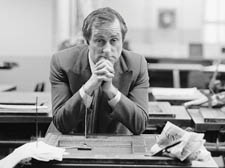|
|
 |
| |
 Harold Evans in a deserted newsroom during the year the Sunday Times was shut down Harold Evans in a deserted newsroom during the year the Sunday Times was shut down |
The trouble with Harry
Harry Evans’ biography looks back on a Golden Age of a free printed press, writes Gerald Isaaman
My Paper Chase: True Stories of Vanished Times. By Harold Evans.
Little, Brown £25
BLOODY Marvellous! shouted the Daily Mirror’s front page after Dunkirk.
What had been a rout of the British Army in retreat was turned into a triumph that still echoes today, despite historians digging out the truth about the debacle.
Churchill worried that defeat would drain the nation in its blackest hour. “Truth is so precious that she should be attended by a bodyguard of lies,” he explained later when the defining moment had past.
Yet, on the beach in Rhyl, North Wales, schoolboy in short trousers Harry Evans on holiday with his family, saw it for himself, as the dead, dying and defeated dumped there told their dramatic stories of having nothing to fight with.
In what is undoubtedly a classic opening chapter to his warm, friendly, wise and valuable memoirs, Evans, the working class Lancashire lad who almost died from pneumonia at three, failed his 11 plus yet ended up a legendary Fleet Street editor, paints the ultimate dilemma that faces journalists committed to telling the truth.
“The discordance between the waterfront and the front pages was bewildering, the first vague stirring of doubt about my untutored truth in newspapers,” he writes, and ponders: “How did newspapers come to conclusions?
“Were they acting at the request of government? Was there a deliberate and widespread gloss on Dunkirk Would that have been justified as a means of sustaining the nation’s morale at a crucial time? How does a newspaper decide these things?”
And he adds: “After a lifetime in newspapers, the same questions resonate with me.”
Now 81 and an admired and comfortable exile in New York, where his second wife, Tina Brown, runs the Daily Beast website, he remains nostalgic about his homeland, the most poignant section of his autobiography undoubtedly dealing with growing up poor and uneducated but with a passion to succeed.
He certainly made it to the big time when he came to London in 1966, to take the Sunday Times chair for 14 exhilarating years, best remembered now for unveiling the truth about the dangerous drug thalidomide, amid many scoops such as the campaign for a posthumous pardon for Timothy Evans, which eventually resulted in his knighthood in 2004.
And he moved, of course, to the Northern Heights.
“Among the things I have missed living in the US these last 25 years is the joy of Highgate living,” he told me. “Our house in Holly Lodge Gardens was not an architectural masterpiece but it was big enough for three growing children – and a table tennis table where Roy Jenkins demonstrated his skill.
“Enid and her mother used to cook for an odd variety of movers, shakers, so it was a marvellous place for an editor. Living on top of Highgate hill was actually exhilarating – in walking distance of the Heath, art and tea and music at Kenwood without a yob in sight,.
“And I was only 20 minutes or so, by tube or car, from the throbbing office. Yes, I shall always miss those things wherever I am. Most of all, I miss the raw vitality of the British press, some aspects of the BBC – I hope they don’t dumb down too much – the championship of that remarkable staff on the Sunday Times.”
This is an appropriate and troubling moment for Harry to tell his remarkable story, though parts of it have appeared in previous memoirs, the more so because, worldwide, newspapers are crashing – 60 weeklies in this country have closed in the past year, let alone major city dailies in America – and some are in mourning for the death of what Harry once called the half-free press.
Newspaper circulations and advertising revenues are dropping, despite all the scandals of bankers’ bonuses, MPs’ expenses, celebrity infidelities and corruption in sport, under the onslaught of the internet and amazing technologies that have changed the culture of new generations, their minds too.
And because too many newspapers are so negative, have got their priorities – and decision making – seriously wrong, speculation and so-called sensations replacing hard facts and the news you need to know. They won’t necessarily die as such but the influence and respect newspapers had in Harry’s heyday, because of the trouble he took and the inspired news teams he created, are gone.
This autobiography is a rich, vibrant and wonderful legacy, one that will make you wonder, alas, what you are missing today. Bloody marvellous, I call it.
|
 |
|
|
 |
 |
|
 |
|
 Harold Evans in a deserted newsroom during the year the Sunday Times was shut down
Harold Evans in a deserted newsroom during the year the Sunday Times was shut down
